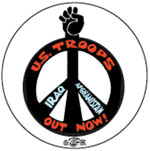US Troops Out Now!
by Betsy The US peace movement has been pretty much stymied about what to propose about the situation in Iraq. It’s hard to avoid a sense of responsibility about the violent chaos we hear about each day. Even when we opposed going in to Iraq in the first place, there’s a sense in which “We broke it; now we’ve got to fix it.” And “fixing it” seems to involve leaving the troops there to keep the peace.
The US peace movement has been pretty much stymied about what to propose about the situation in Iraq. It’s hard to avoid a sense of responsibility about the violent chaos we hear about each day. Even when we opposed going in to Iraq in the first place, there’s a sense in which “We broke it; now we’ve got to fix it.” And “fixing it” seems to involve leaving the troops there to keep the peace.
Well, thanks to President Bush, things are getting simpler! His proposal to escalate the conflict by adding more troops is so far from the will of the voters expressed in November that we peace activists are feeling less ambivalent. Just in the last week I’ve seen many more calls to withdraw now — not so much from Congresspeople as from peace activists. Eventually the idea will trickle up to our leaders! I think the message we want to send our elected representatives is, “Restrict funding to the amount needed to begin withdrawing our troops safely now. Cut off the funding, yes, but leave enough for a speedy and safe retreat.”
One of the good articles published recently is by Michael Schwartz, “The Myth of More”, on TomDispatch.com. He says,
“Let’s review this paradox. In a time when the Brookings Institute reported that Iraqi military strength increased by slightly less than 90,000 troops and American troops remained steady at 140,000, the insurgency dramatically increased in intensity. More actually seemed to work in favor of the insurgents. Why didn’t a larger presence result in a greater suppression of insurgent violence for longer periods of time?
“Solving this paradox requires understanding the fundamental horror of Bush administration policy in Iraq: American troops are not quelling violence; they are creating it. Instead of entering a violent city and restoring order, they enter a relatively peaceful city and create violence. The accurate portrait of this situation — as described, for instance, by Nir Rosen in his book In the Belly of the Green Bird, is that the most hostile anti-American cities like Tal Afar and Ramadi have generally been reasonably peaceful when U.S. troops are not there. They are ruled by local leaders in league with local guerilla fighters. The insurgents — most often organized into armed militias — provide policing functions, as well as enforcing the (usually fundamentalist) religious laws that are currently dominant in both Sunni and Shia areas of Iraq.
“These cities do not accept the sovereignty of the Iraqi government or of the American occupation, and therefore when the Americans seek to impose an outside government and root out the insurgency’s military leaders, the cities explode. On hitting the streets, American troops usually seek to arrest or kill local militia leaders, while the insurgents begin to set IEDs or mount sniper attacks to prevent the U.S. from controlling the town. Because the insurgents are usually supported by many in the community and U.S. tactics are generally destructive, American military ’successes’ produce new insurgents, recruited to avenge the deaths of friends and relatives. When U.S. forces withdraw, the city or town returns to something like its previous status quo (with insurgents once again playing the role of local police) — but, of course, it’s also more battered, economically worse off, angrier, more on edge.”

So much for keeping the peace! How about letting the Iraqis govern themselves? After all, we believe in democracy, don’t we?
